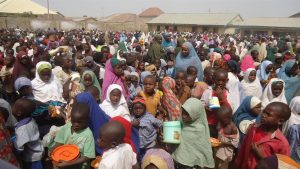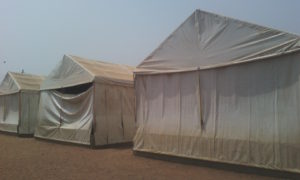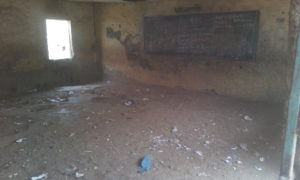By Longtong Ibrahim

“Where were these thousands of children that came up all of a sudden to enroll into school because of free feeding? I’m just imagining where these children will be in the next 10 to 15 years if they are not educated. They will become a big problem to our country and even be worst than Boko Haram.”
The above statement was a point of concern for the Chairman, School Based Management Committee (SMBC), of UBE Primary School Layin Biliya, Rigasa, (a community school in North-western Nigeria), Idris M. Sheriff, where over 65 percent of pupils stopped schooling after the Kaduna State government suspended the free feeding program it introduced to public schools in 2016.
In February 2017, school attendance in UBE Primary School, Layin Biliya has reduced to about 5,000 from 19,954 pupils who enrolled in February 2016 when the program began.
It would be recalled that the Kaduna state Governor, Nasir El-Rufai during the flag-off ceremony of the program on 17th January, 2016, said, the feeding intervention was necessary to boost nutrition, health of the children, and also encourage school attendance; noting that, the free feeding program will expand access to education.

This development attracted lots of pupils and students’ enrolment, but the case is not the same now as the suspension of the program has led to a large drop in school attendance; one of such schools is UBE Primary School Layin Biliya.
Speaking with Africa Prime News, the SBMC Chairman said, before the commencement of the program, the school had a little above 2000 pupils, and it later rose to almost 20,000 when the program began but currently, it is declining because government suspended it.
He said, “Currently the pupils are not more than five thousand in both morning and afternoon session.”
“We believed it was the school feeding that attracted them if not why then did they stop coming because school feeding has stopped?” he questioned.
He however noted that after the school pled for school expansion in order to accommodate the increasing number of pupils, government heard and bought a house in the neighborhood, mounted a temporal tent within the school compound, but they have not started using them because number of pupils have drastically reduced.
While commending the Government for initiating the program, Sheriff tasked El-Rufai to resume the school feeding program so as to make the children return to school and be educated for the advancement of Nigeria.
“Education is important and any program that would attract students’ enrollment should be encouraged. These children are vulnerable to manipulations but when they are educated they become wise and difficult to be manipulated.
“Because of this, El-Rufai should bring back this program so that the lives of this children and the future of our country could be secure,” he emphasized.

Sherif observed that the school is lacking facilities that will ensure effective learning.
“We have made little efforts and cemented the floor of some classrooms instead of sitting on the dust; some of the pupils stand while some sit on window walls during classes and that hinders effective learning.”
Corroborating what the SBMC Chairman said, a volunteer assigned to the school by the Parent Teacher’s Association, Mohammed Yunus, decried the state of facilities in the school. He said some of their challenges include; lack of toilets, chairs, classroom, windows, doors, and security, noting that six irons used in mounting the tents have been stolen because the school lacks a watchman
The state government began the school feeding program in January 2016 at the cost of N1.1 billion monthly.
The Education Commissioner in the state, Andrew Nok, said government has spent over eight billion naira within the first eight months of the program in 2016, explaining that, government is putting all the needed logistics to resume the feeding program.
According to him, “Under the arrangement, the Federal government will feed students from primary one to three, while the state government will feed students from primary four to six.
It was also agreed that the Federal Government would refund to the state 60 percent of the amount spent on feeding primary one to three pupils. However the program was suspended after eight months following the failure of the Federal Government to reimburse the state as agreed.